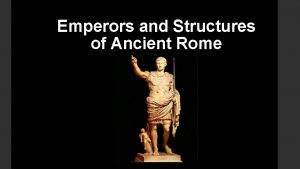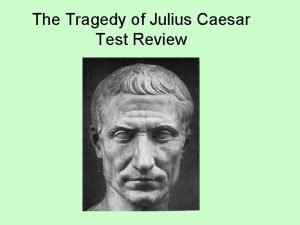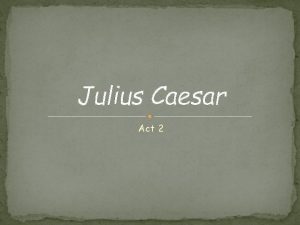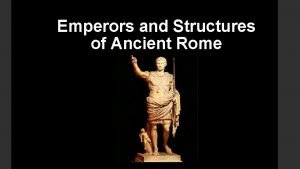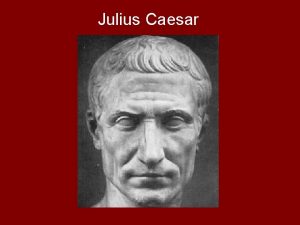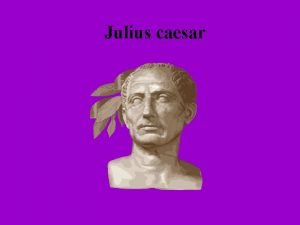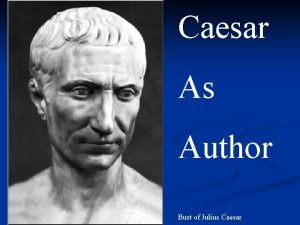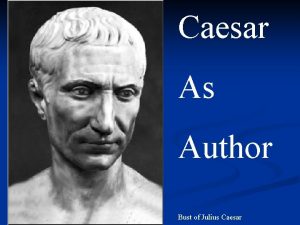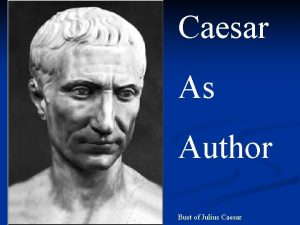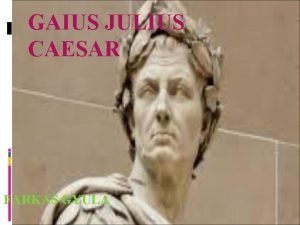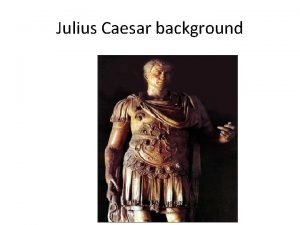Name period Assassination of Julius Caesar Caesars assassination















- Slides: 15

Name period

Assassination of Julius Caesar - Caesar’s assassination occurred on the “Ides of March” (March 15, 44 BC). The location of his infamous murder was in the Theatre of Pompey. According to the “Tragedy of Julius Caesar”, the key murderers were Cassius and Brutus- Born Marcus Junius Brutus, was apart of the Senate of the Roman Republic. He played a significant role in Julius Caesar’s death; he was one of the conspirators. Even though Caesar and Brutus were close friends, he felt the need to help murder Caesar for the greater good of Rome.

Classical antiquity- Also known as the Classical Era or the Classical Period, was a long period of Roman Literature which began to grow. The period began in the 8 th- 7 th century BC to 5 th century AD. Roman Poets that were known during the classical era such as Ovid wrote mythological and erotic poems. Dictator- In the play of “Julius Caesar”, the senators were afraid of Caesar becoming a dictator if accepted the throne as king of Rome. Before Caesar, Lucius Cornelius Sulla was a Roman general as well and he was the dictator of Rome. The senators didn’t want to lose power and have Caesar become another Sulla.

Et tu Brute? - The meaning of “Et tu Brute? ” means “You too, Brutus? ”. It is a phase in Latin and were the last words of Julius Caesar in the William Shakespeare play, “Julius Caesar said the saying when he was slowly dying from the puncture wounds of Brutus and the other conspirators asking Brutus why he has betrayed him. Flavus- Lucius Caesetius Flavus was one of the two tribunes/senators that were punished by Julius Caesar. A civilian of Rome placed a crown on Caesar’s statue, but Flavus and his colleague, Marcellus quickly removed it. Caesar stripped Flavus and Marcellus of their positions.

Gladiator- A gladiator was an armed fighter who entertained officials of the Republic of Rome and the Roman Empire. The fighters would have to compete against other gladiators or wild animals. The gladiators would mostly be risky volunteers, slaves, or citizens of the low social ranking. Hatred- Hate was what the conspirators (except for Brutus) had towards Caesar. They assassinated Julius to prevent him from becoming King of Rome. They also wanted to keep power of Rome instead of having Caesar to take over.

Insula- The Insula was an apartment building in Rome where the low and middle social classes (Plebs and Equates) dwelled in. The bottom floor of the Insulae was used for establishing shops and businesses. The higher floor was used for shelter. Julius Caesar- Born Gaius Julius Caesar, was a member of the Roman Consul and a Roman General. He was the main character in “The Tragedy of Julius Caesar. ” He was assassinated on March 15 th by multiple senators including most importantly, Brutus and Cassius.

King- The civilians of Rome wanted Caesar to become king among them. Julius Caesar denied the throne thrice and he just wanted to be known simply as “Caesar”. Even though he denied being king, the civilians applaud his denial and one citizen placed a crown on his statue. Livy- Born Titus Livius, was an Ancient Roman historian who wrote about Rome’s history and Roman people. He was the author of “Ab Urbe Condita Libri”, or “Chapters from the Foundation of the City” which was a monumental history of Ancient Rome. Livy wrote “Chapters from the Foundation of the City” in the Latin Language.

Melancholy- Melancholy was the mood in the Julius Caesar play in Act I, scene 3. Act I, Scene 3 shows how before the “Ides of March” a storm comes and one of the characters, Casca tells another one of the characters, Cicero that he has been witnessing unusual things lately. A few things he has witnessed was a lion in the Capitol and an owl hooting at a marketplace at noon. Numa Pompilius- Pompilius was the second king of Ancient Rome. He reigned from 717 -673 BCE. After his reign, the third king of Rome was Tullus Hostilius.

Octavius Caesar- Born Gaius Julius Caesar Augustus, was the adopted son of Julius Caesar. In the play, he alongside Marc Antony defeat the forces of Brutus and Cassius. This defeat results in Brutus’ and Cassius’ suicidal deaths. Pompey- Born Gnaeus Pompeius Magnus, was not a character in William Shakespeare’s play of Julius Caesar, but he does have connections to Caesar. He was a close ally to Caesar and he married Caesar’s daughter, Julia. Pompey was assassinated in Egypt in September 29, 48 BC.

Queen of Egypt- The Queen of Egypt was Cleopatra VII. She was also not in Shakespeare’s play, but she did have an affair with Caesar. After Caesar’s death, she later married Marc Antony. Romulus and Remus- They were Rome’s twin founders. They founded Rome on April 21, 753 BC. Romulus and Remus’ discovery of Rome is just a mythical legend.

Self-centered- Self-centeredness was shown in the Julius Caesar plays (The Tragedy of Julius, Julius Caesar comic strip). The senators assassinated Julius Caesar because they didn’t want to lose any power if Caesar became king of Rome. The senators, except for Brutus did not kill Caesar for the better of Rome. Trebonius- Gaius Trebonius was a member of the consul in Ancient Rome. He was not one of the main characters in Shakespeare's Caesar play. He was one of the conspirators that was involved in Julius Caesar’s assassination.

Unconditional love- Unconditional love is what Calpurnia had for Caesar. Even though Caesar had an affair with Cleopatra, Calpurnia stayed with Caesar. Calpurnia also tried to save Caesar from being murdered, but failed to do so. Vicarius- In Ancient Rome, vicarius was used as a term/title for different Roman officials. The word means, in english “deputy”. Each vicarius would be appointed to a particular official of a high rank.

William Shakespeare- William Shakespeare was the playwright of the Elizabethan Era who wrote “Julius Caesar”. He wrote the play in 1599. The genre of the play was tragic drama.


Works Cited • Davis, Kate. “Julius Caesar. ” Read Magazine. Pg. 33 -50 • Shakespeare, William. “Julius Caesar. ” West Haven: Pendulum Press, Inc. 1980 • Shakespeare, William. “The Tragedy of Julius Caesar. ” Elements of Literature. Schirmer, Robert. Austin, Texas, 2000. pg. 777 -877 • Wikipedia: The Free Encyclopedia. May 5, 2010 <http: //en. wikipedia. org/wiki/Main_Page>
 Julius caesar vs caesar augustus
Julius caesar vs caesar augustus Caesar (title)
Caesar (title) William shakespeare family tree
William shakespeare family tree Khubris
Khubris Exposition of julius caesar
Exposition of julius caesar Summarize artemidorus` letter to caesar in act 2, scene 3.
Summarize artemidorus` letter to caesar in act 2, scene 3. Example of ethos in julius caesar
Example of ethos in julius caesar A short poem that expresses an idea in a clever way is
A short poem that expresses an idea in a clever way is Julius caesar newspaper article
Julius caesar newspaper article Motifs in julius caesar
Motifs in julius caesar Potpourri jeopardy questions
Potpourri jeopardy questions Iambic pentameter julius caesar
Iambic pentameter julius caesar Caesar act 2 summary
Caesar act 2 summary Measuring some 620 by 513 feet
Measuring some 620 by 513 feet Cesarean julius caesar
Cesarean julius caesar Julius caesar intézkedései
Julius caesar intézkedései

